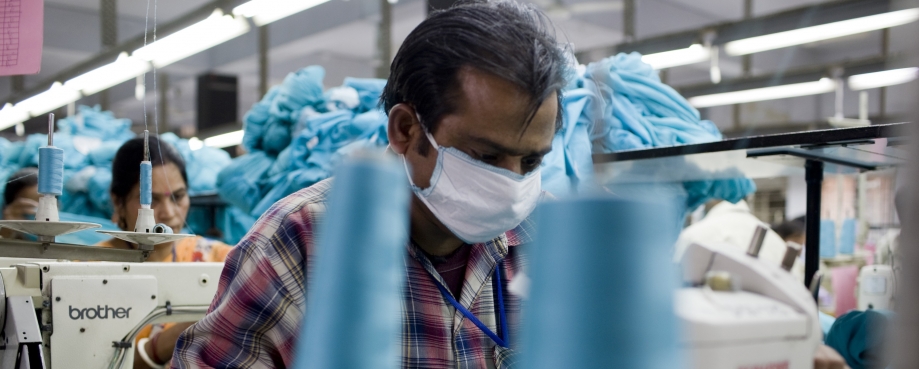
Interest in company purchasing practices is growing among activists, who charge that ultra-high speed and low-cost retailing can pose a significant risk to the rights and working conditions of workers in supply chains. Here’s more information.
Recently, Human Rights Watch (HRW) convened a group of experts to discuss company purchasing practices. ETI’s Martin Buttle, who heads up our thinking on business models attended and Jane Moyo asked Martin to explain more.
Why were you invited and who else attended?
HRW are looking into company purchasing practices and were seeking alignment with other interested parties on their expectations of companies. While the two-day workshop was held under Chatham House Rules, representatives from organisations such as ACT, Better Buying, Clean Clothes Campaign, and the Fair Wear Foundation were in attendance, as well as senior independent consultants, campaigners and activists. Frankly, they were people I know and respect – and I suspect this will also hold true for company representatives too.
I understand that discussions were technical and wide-ranging but clustered around five major issues. Can you tell me what they were?
There was a lot of interest in transparency, which as we know has been on campaigners’ agendas for some time now. But we also discussed brand sourcing models and intermediaries; collective bargaining agreements, wage bills and costing models; occupational health and safety, which rightly never goes away; and finally, brand buying codes and policies governing purchasing practices.
Tell me about your discussions on transparency in purchasing practices?
Transparency has always been a key campaigners ask. As such, there was a lot of focus on multi-stakeholder initiatives such as ETI aligning their purchasing practices expectations of members.
Personally, I believe ETI’s collaboration with Better Buying, for example, is the kind of partnership that is needed. But I was closely questioned on the extent to which we have integrated such collaboration into our internal company reporting structures [Editor: companies report on progress annually to ETI but results are currently confidential].
I was also questioned about how we promote and support Better Buying and other anonymous supplier ratings. There was a lot of discussion about some potentially very exciting initiatives.
It will be interesting to see what HRW will make of all of this in their thinking. I suspect they’ll be looking at how brands price-in living wages – at ETI, we’ve always believed ring fencing wages in costings is a good thing, as well as the management of critical path around ordering, payment terms, efforts to smooth out peaks and troughs in demand, and the degree to which brands are using agents and intermediaries.
Your views on brands using agents and intermediaries?
There are certainly valid concerns about the extent to which sourcing through agents and intermediaries insulates brands from purchasing practices discussions. And to what extent licensee/licensor business models’ complicate expectations on purchasing practices? However, the reality is that we’re still at the questioning stage on the ethics of using intermediaries and whether sourcing through them can be justified. I don’t have the answers at the moment and it certainly needs more thought.
ETI’s Base Code strongly emphasises the importance of freedom of association/collective bargaining and of paying living wages. Were these discussed in the context of costing models?
Yes, they were. We heard about the work going on to measure impact and correlate improvements in purchasing practices with improvements for workers. ACT told us how it is concentrating on sector wide collective bargaining and brand purchasing practice commitments while Fair Wear Foundation (FWF) has a new standard-minute labour cost calculation tool. FWF will be making that open-source soon and it can be used to ring-fence or isolate labour costs.
There’s also increasing investor demands of retailers around living wage and purchasing practices, particularly focused on NYU Stern’s purchasing practices metrics for investors and the Dutch Platform for Living Wage Financials with their expectations of brands reporting on living wages. I should also add that we’re starting to see investor movement in the UK as this recent ETI guest blog on finance for good shows [Editor: we’re tempted to say “about time too” – read our recent blog on Living Wages: eight steps to help companies take the leap of faith].
What about costing for occupational health and safety?
There was a lot of discussion on how big investments and factory upgrading (such as in the Bangladesh Alliance/Accord remediation efforts) could be financed and costed in and on the forms of financial assistance that can brands can provide. I’m thinking volume commitments, letters of credit, underwriting loans and even one-off payments from Foundations.
Anything else?
I mentioned brands working to buying codes and having policies governing purchasing practices – it’s something that is covered in our Guide to Buying Responsibly.
What’s also very clear is that there is a definite sense of momentum around the topic with many organisations planning how they will be working in this area. We all know that brands ignore activist and consumer concerns at their peril. It’s why, as ever, we stand ready to help members with practical advice on good practice.
